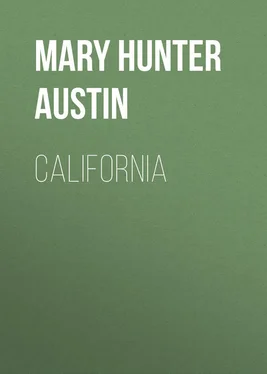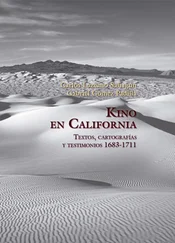Mary Austin - California
Здесь есть возможность читать онлайн «Mary Austin - California» — ознакомительный отрывок электронной книги совершенно бесплатно, а после прочтения отрывка купить полную версию. В некоторых случаях можно слушать аудио, скачать через торрент в формате fb2 и присутствует краткое содержание. Жанр: foreign_antique, foreign_prose, на английском языке. Описание произведения, (предисловие) а так же отзывы посетителей доступны на портале библиотеки ЛибКат.
- Название:California
- Автор:
- Жанр:
- Год:неизвестен
- ISBN:нет данных
- Рейтинг книги:4 / 5. Голосов: 1
-
Избранное:Добавить в избранное
- Отзывы:
-
Ваша оценка:
- 80
- 1
- 2
- 3
- 4
- 5
California: краткое содержание, описание и аннотация
Предлагаем к чтению аннотацию, описание, краткое содержание или предисловие (зависит от того, что написал сам автор книги «California»). Если вы не нашли необходимую информацию о книге — напишите в комментариях, мы постараемся отыскать её.
California — читать онлайн ознакомительный отрывок
Ниже представлен текст книги, разбитый по страницам. Система сохранения места последней прочитанной страницы, позволяет с удобством читать онлайн бесплатно книгу «California», без необходимости каждый раз заново искать на чём Вы остановились. Поставьте закладку, и сможете в любой момент перейти на страницу, на которой закончили чтение.
Интервал:
Закладка:
As artists know colour, and poets know it, this is the most colourful corner of the world. The blue and silver tones of the Sparrow-Hawk's land give place to airy violets, fawns, and rich ambers. It is curious, that obstinate preference which a locality has for colour schemes of its own adoption; man can break up and re-form them, but he can never quite overcome the original key. Here the bright, instant note of the geraniums that shore up the bungalows, even the insult of the magenta-coloured Bougainvillea is subdued by the aerial softness that lies along the hills like the bloom on fruit. The sheets of Eschscholtzia gold that once spread over miles of the San Gabriel valley, and still linger in torn fragments about Altadena, have been sheared by the plough, to vanish and reappear again in the solid globes of orange, distilled from the saps and juices of the soil.
One of the most interesting of the instruments by which the cultivated landscape has gathered up and fixed the evanescent greens that spread thinly yet over the uncropped hills in spring, is the eucalyptus. All the tints are there, from the olive greens of the chaparral to the sombre darkness of the evergreen oak; young shoots of it have the silvery finish of the artemisia which once gave the note of the mesas about Riverside and San Bernardino. No other imported tree has quite to such a degree the air of the habitué ; one wonders indeed if it could have been half so much at home in Australia, from whence it has returned like some wandering heir to the ancestral acre.
It proves its blood royal by its facile adaptiveness to the prevailing lines of the landscape, taking the rounded, leaning outline of the live oaks on the wind-driven hills, or in sheltered ravines springing upward straight as the silver firs. Perhaps its most charming possibilities are revealed in the middle distance where, lifted high on columnar stems, its leaf crowns take on the blunt, flowing contours of the hills. At all times it has a beautiful resilience to the wind, bowing with a certain courtliness without compulsion, and recovering as if by conscious harmonious movement. The pepper tree, however, most magnificent specimens of which may be found lining the avenues of Pasadena, or in some unexpected corner of the hills marking the site of some old Spanish hacienda, is always an alien. It is like the Spaniards who brought it, perhaps, in its drooping grace, in the careless prodigality with which it sheds its fragile crimson fruits. Something of old-worldliness persists in its spicy odours, and in the stir of its lacy shadows; when the moon comes over the mountain wall and the wind is moving, there is the touch of mystery one associates with lovely señoritas leaning out of balconies. One fancies that the pepper tree will last so long as the dying race of Dons and Doñas, and with them will cease to be a feature of local interest.
There is hardly more than a trace in the modern city of Los Angeles of Nuestra Señora, Reina de los Angeles . The last time I passed through the old plaza, the streets of offence encroached upon it from the east, and a corner of the sacred precinct had been sacrificed to the trolley. The Church of Our Lady, over whose door may still be traced the fading inscription from which the city takes its name, was never a mission, but one of the six chapels or asistencias centred about the Mission San Gabriel. It was here the first expedition passed northward looking for the port of Monterey, on the day of the feast of Our Lady in the year when the Atlantic Colonies were making up their minds to fight the English. It was close to this spot and along Downey Street were enacted the most pitiful of all the tragic incidents which marked the recession of the aboriginal races. Bereft of their lands and the protection of their Church, they became a prey to the greed of the dominant peoples, and used regularly to be incited to drunkenness upon their wages on Sunday, arrested while in that condition, and sold each Monday morning for the amount of their fines to the neighbouring ranchers. Things like this lurking under the surface of commercial enterprise, as the desert lies in wait in sandy stretches, advise us that much of our insistence on democracy grows out of our inability to trust ourselves to deal equitably with our fellows under any other conditions. We can keep to the rules of the game we have set up more easily than to the unfenced humanities. Here in the old plaza full of sleepy light, which still retains the indefinable stamp of the people to whom to-morrow was always a better day for doing things, one sighs for the short-sighted self-interest which so wasted the native children of the soil.
But after all the land couldn't have loved them as it does the race for which it brings forth its miraculous harvests. Not that there weren't miracles in those days; in fact they began here, or rather at San Gabriel, six miles or so beyond the river which in those days was called Porcincula, a name that linked the old world with the new by way of the little chapel in Italy in which the beloved Francis received such heavenly favours. The miracle of San Gabriel relates to a display of a canvas presentiment of Our Lady, at the mere sight of which the wild tribes experienced exceeding grace. Looking up suddenly at the Mother Mountain brooding above the plain, it is easy to understand how the symbol of aloof but solicitous care came home to the primitive mind, always peculiarly open to suggestions of humaneness in nature.
The heads of the Sierra Madre are rounded, the contours of great dignity. The appeal it makes to the eye is of mass and line. Its charms, and it has many, of forested slope, leaping waters, and lilied meadows, do not offer themselves to the casual glance, but must be sought after with great pains. The bulk of the range is of warm, grey granite, clothed with atmospheric colour as with a garment. It borrows more from the sky than the sea, taking on at times an aerial transparency, the soul of the mountain about to pass trembling into light. Pinkish tones are discoverable in even the bluest shadows, and at times the peaks are touched with the rich, roseate orange of the Alpine-glow. But the variations of temperature and atmospheric conditions are not sufficiently pronounced to present themselves to the sense as the source of its aspects of tenderness, of majesty, of virginal aloofness. Rather such changes seem to be occasioned by palpitations of the Mountain Spirit, remote in sacred meditation, glowing, dimming, defining itself from within.
It may be that the immense vitality of the land, its abundance, the bursting orchards, the rich variety of native growth, somehow dwarfs the earliest impression of the Sierra Madre, since few, if any, gather at first an adequate idea of the actual mass and height it represents. It is only after appreciation of the really amazing activities of the Angelenos is a little dulled by familiarity, at early morning when the groves are sleeping and the bright plantations of the gardens lack the sun to flash their brilliance on the sight, or at evening when a sea mist covers the teeming land, one is prepared to hear that many of these peaks are higher than the Simplon, and that it would be possible to wander for months in the intricacies of its cañons without having time to grow familiar with a single one of them.
Sometimes the mere mechanics of the land, the pull of the wind up the narrow gorges as you pass, advises the open mind of power and immensity residing in the thinly forested bulks. Passing what appears a mere shadowy gulf in the mountain wall, you are aware of a murmurous sound as of the sea in a shell, and feel suddenly the push of the draught on your windshield like a great steady hand. In places above San Bernardino, the steady pouring of invisible wind rivers has swept the soil for miles and defied three generations of artificial plantations. And sometimes the mountain speaks directly to the soul. I recall such an occasion one late spring. We had been skirting the range toward Riverside all afternoon, having the fall of the land seaward always in view, noting how, in spite of the absurd predilection of men for square fields and gridiron arrangements, the main lines of cultivation were being pulled into beauty by the sheer necessity of humouring the harvest. It was that lagging hour between the noon splendour and the gathering of the light for its dramatic passage into night. The orange orchards lay dead green in the hollows, unplanted ridges showed scarcely a trace of atmospheric blueness; unlaced, unbuskined, the land rested. And all in the falling of a leaf, in the scuttle of a horned toad in the dust of the roadway, it lifted into eerie life. It bared its teeth; the veil of the mountain was rent. Nothing changed, nothing stirred or glimmered, but the land had spoken. As if it had taken a step forward, as if a hand were raised, the mountain stood over us. And then it sank again. While the chill was still on us, the grip of terror, there lay the easy land, the comfortable crops, the red geraniums about the bungalows. But never again for me would the Sierra Madre be a mere geographical item, a feature of the landscape; it was Power, immanent and inescapable. Shall not the mother of the land do what she will with it?
Читать дальшеИнтервал:
Закладка:
Похожие книги на «California»
Представляем Вашему вниманию похожие книги на «California» списком для выбора. Мы отобрали схожую по названию и смыслу литературу в надежде предоставить читателям больше вариантов отыскать новые, интересные, ещё непрочитанные произведения.
Обсуждение, отзывы о книге «California» и просто собственные мнения читателей. Оставьте ваши комментарии, напишите, что Вы думаете о произведении, его смысле или главных героях. Укажите что конкретно понравилось, а что нет, и почему Вы так считаете.












